The English School Timeline
A Second Century
The English School, Nicosia, has stood as a cornerstone of education in Cyprus since its founding in 1900. With a legacy of academic rigour, inclusivity, and innovation, the School has evolved over the decades, responding to challenges and embracing opportunities to serve its diverse student body.
The English School, Nicosia: A 125-Year Journey of Excellence
1900-1910 - Founding Vision
- 1900: Founded by Canon Frank Darvall Newham, The English School began with 12 boys in a rented house on Victoria Street. The boys were Jules and Tenarde Vitalis, Stephen, Oswald and Williams Maltas, Thales Cababe, Maurice Constantinides, William Giles, Arthur Mavrocordato, Joseph Carletti, Edwin Prince and Alfred Griffin.
- 1900: Introduction of Football to Cyprus - The school's students played the island's first football match, introducing the sport to Cyprus
- 1900: Introduction of Cricket and Hockey to Cyprus - Alongside football, Canon Newham introduced cricket and hockey to the island, broadening the athletic activities available.
- 1906: School population reaches 40, despite predictions that its pupils would not exceed 20.
- 1909:
- Newham purchased land of 33 donums (11 acres) adjacent to the Pedieos River, near Paphos Gate, for GBP1100, at EUR30-35 per donum, to erect school premises.
- First School newspaper (magazine) in Cyprus. School Echo was issued by Odysseas Evryviades (Wideson), a pupil of The English Schoo, who later became a correspondent for the Elefhteria daily newspaper.
- Mr Dimitris Lipertis was appointed as a teacher at The English School. He is a revered Cypriot poet and writer. His literary works, particularly in the Cypriot dialect, have left a lasting impact on Cypriot literature.
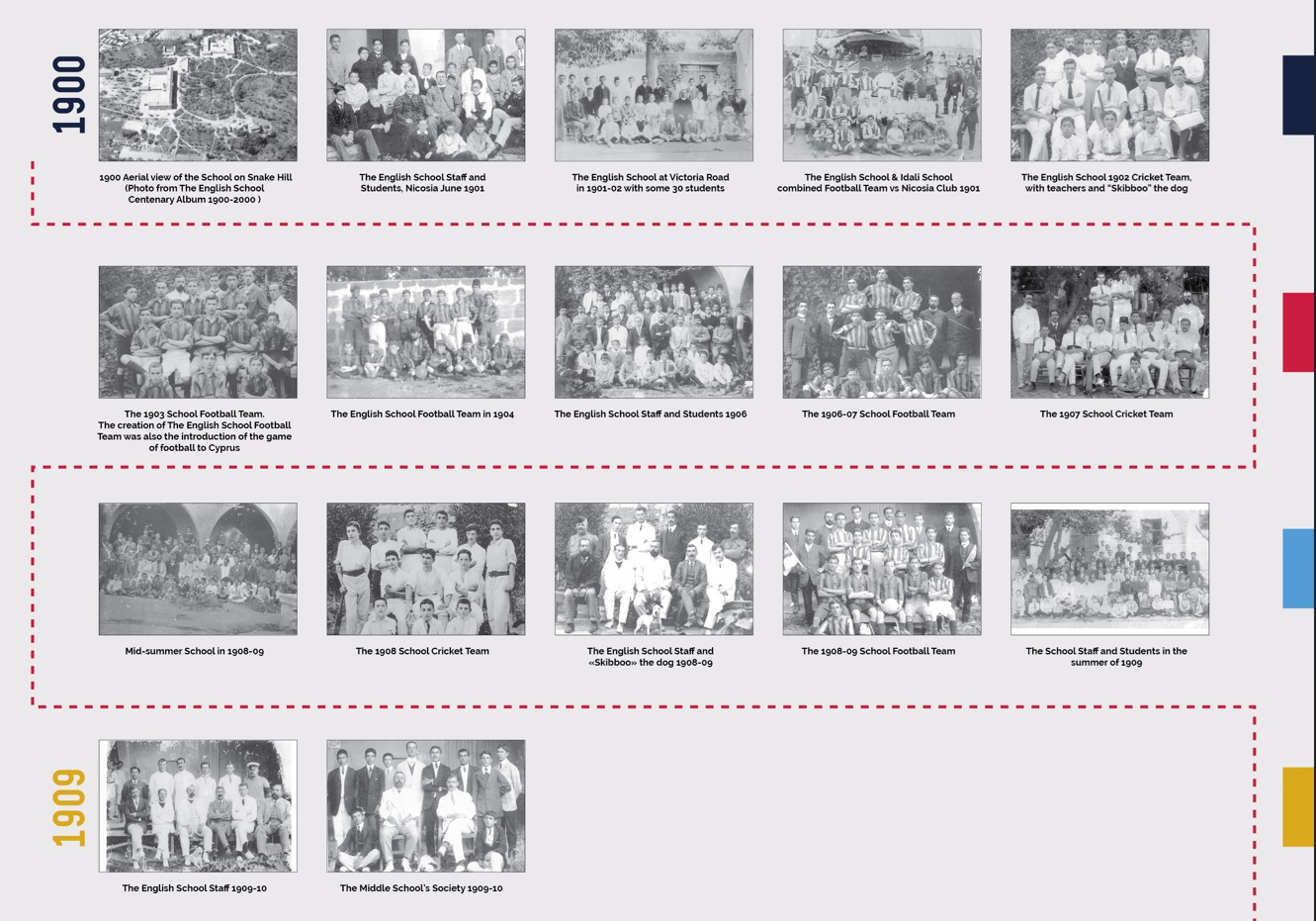
There was rapid growth in student enrollment, solidifying the School's role as a leading academic institution. Cultural and athletic traditions began to take root, further enriching student life.
- 1910: The school population increased to 82 pupils (30 boarders). The first football and hockey matches against the American Academy of Larnaca took place, and the school won both. Skiboo, the famous School dog, dies. Skiboo II takes his place.
- 1911-1912:
- Construction of new English School premises and grounds by the Pedieos River designed by architect George Jeffery (Curator of Ancient Monuments). The Pedieos premises were used from 1912 to 1934 when the army took over and became Wolseley Barracks.
- School numbers exceed for the first time 100.
- The School Orchestra was established.
- 1912: Canon Newham established a football league in Cyprus; the first official football game was played at The English School fields by the Pedieos River. The first game of football in Cyprus was played by English School pupils in the Moat (on the outside of the Nicosia medieval walls) in the vicinity of Ledra Palace Hotel. He suggested an FA Challenge Cup for Cyprus. The first annual Hockey games against the American Academy Larnaca was played.
- 1914:
- Annual Sports Shield between The English School and the American Academy of Larnaca, inaugurated and held at the School grounds. The shield was donated and presented by the High Commissioner of Cyprus, Sir Hamilton Good-Adams. The Academy won by 61 to 47 points.
- There are now 113 pupils and all the boarders were living on the premises. Senior classes were still at Victoria Road.
- The First World War breaks out. 80 English School boys fought, two were killed. School continues its operations.
- 1915: During the Annual Prize ceremony attended by High Commissioner Sir John and Lady Clauson, Canon Newham referred to the substantial progress made with 142 boys on the role.
- 1919: Mr Alexandros K. Papadopoulos (Alkidas), affectionately known as Professor Alkidas, joined The English School as a teacher under the leadership of Canon Frank Darvall Newham. His exceptional dedication to education left a lasting legacy at the School.
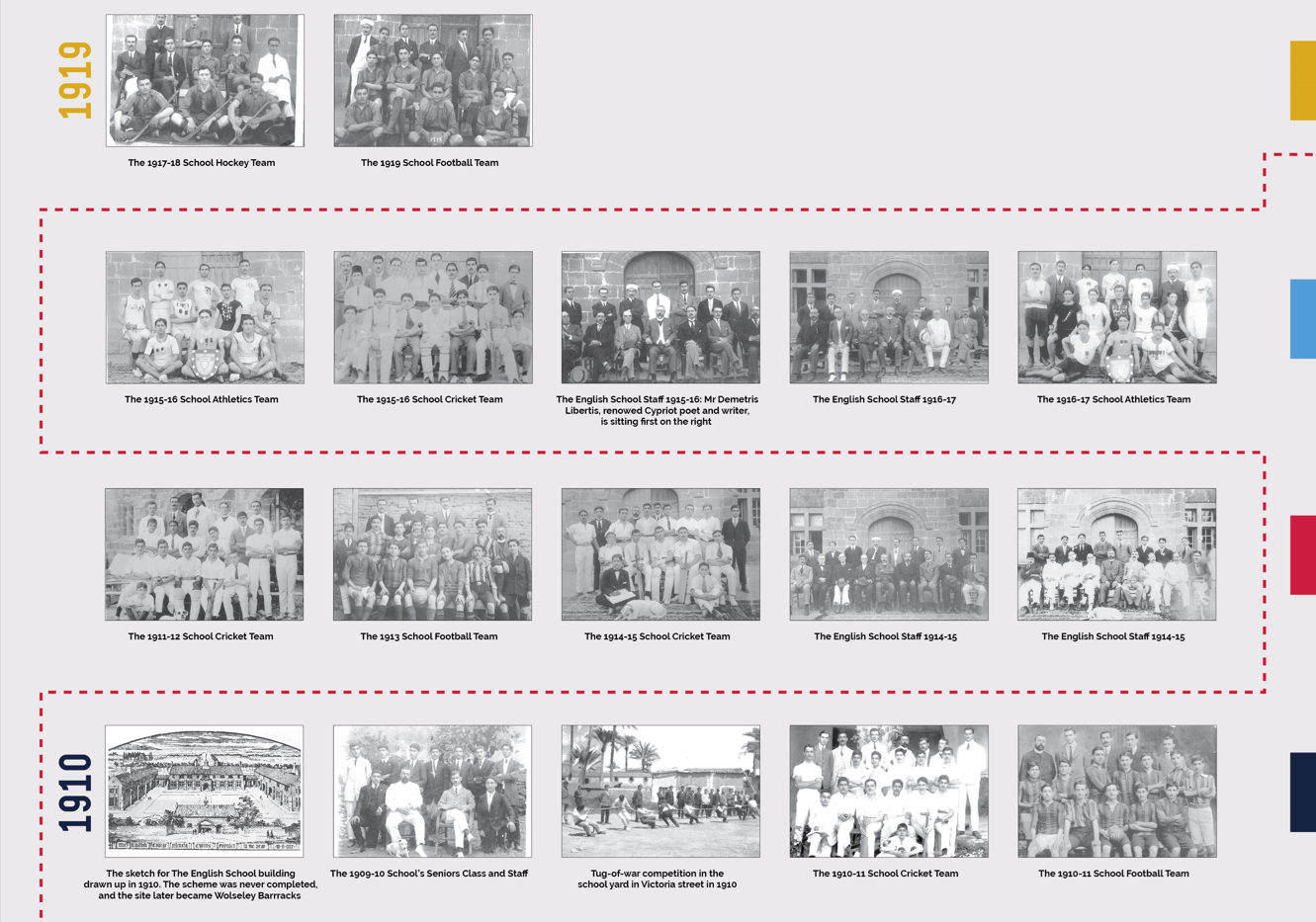
The School expanded its reach, attracting students from diverse communities locally and internationally. It became known for its academic rigour and commitment to inclusivity.
- 1920: The school population reached 200 for the first time. Two female pupils at the school (before 1957). They were Miss Meda Petrides and Miss Angeliki Christopoulou.
- 1921: School population teachers 1038.
- 1920–1921: Community and Inclusion: The school staff, alongside the Alks Boarding House, laid the foundation for a more inclusive educational environment. Mr. Alkidas, seen in the photograph with Canon Newham, became an enduring symbol of dedication and excellence at the school.
- 1922: During the great measles epidemic, only The English School and one other school on the island stayed open.
- 1923–1924: Expansion of Activities: By this time, the school’s hockey and athletics teams were well-established, reflecting the growth of extracurricular activities. The School Library was established, and the Debating Society was established. The first school premises on Victoria Road, which had been partly used since 1914 when the school moved to its premises by the Pedieos, were finally abandoned.
- 1928:
- Queen Mary of Romania (of English origins) visits the School on Sports Day
- The English School Old Boys Association (ESOBA) was established.
- 1928–1929: Formation of Sports Teams: The school had flourishing athletics, football, and hockey teams, demonstrating its emphasis on physical education. These teams became pivotal in encouraging inter-school competitions and building community spirit.
- 1928: The School Flag with its crest int he centre is adopted and flown.
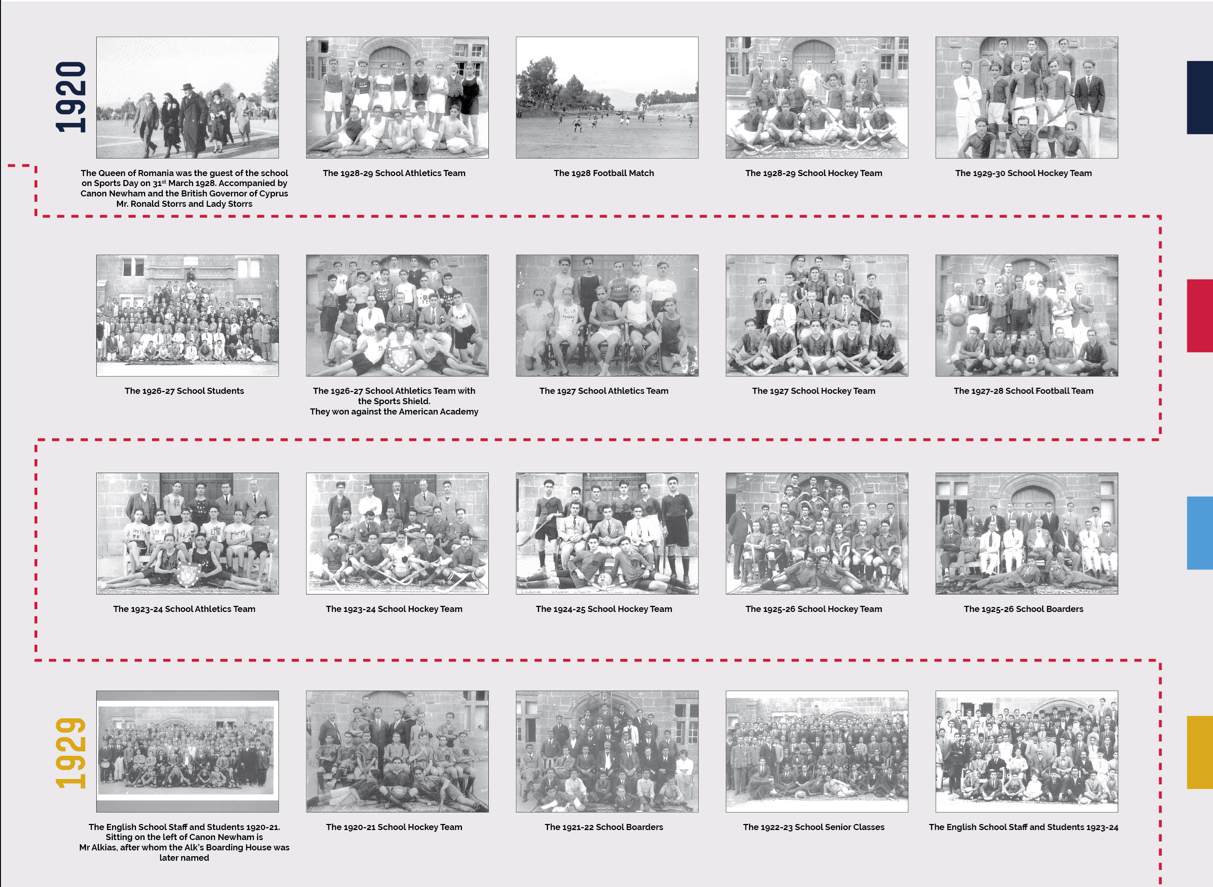
- 1930: Control of the school was transferred to the British Governor, marking its transition from a private venture to a government-administered institution.
- 1934: The school suffered its first major setback when the army requisitioned the English School building at the Paphos gate (now the Nicosia Supreme Courts) at only 14 days' notice and converted it into the Wolseley barracks. The school was obliged to move into a house on Byron Avenue, and the boarders' quarters were also moved. Due to the shortage of accommodation, there are now only 130 pupils on roll compared to over 200 in the previous couple of years.
- 1935: Introduction of The English School Management and Control Law, allowing students of all faiths to practice their religions.
- 1936: Mr George Sims is appointed as Headmaster. Princess Mary, the Princess Royal, visited the school, marking one of the earliest royal engagements in its history
- 1938: Moved to its current location opposite the Presidential Palace in Nicosia, providing a permanent home for the institution. Due to the imminent outbreak of the war, the School is instructed by Mr Sims, the Headmaster, on air raid precautions
- 1939: Mr. Luther Salakian, a dedicated teacher, established the St. John Ambulance Brigade at the school, providing students with essential first-aid skills.
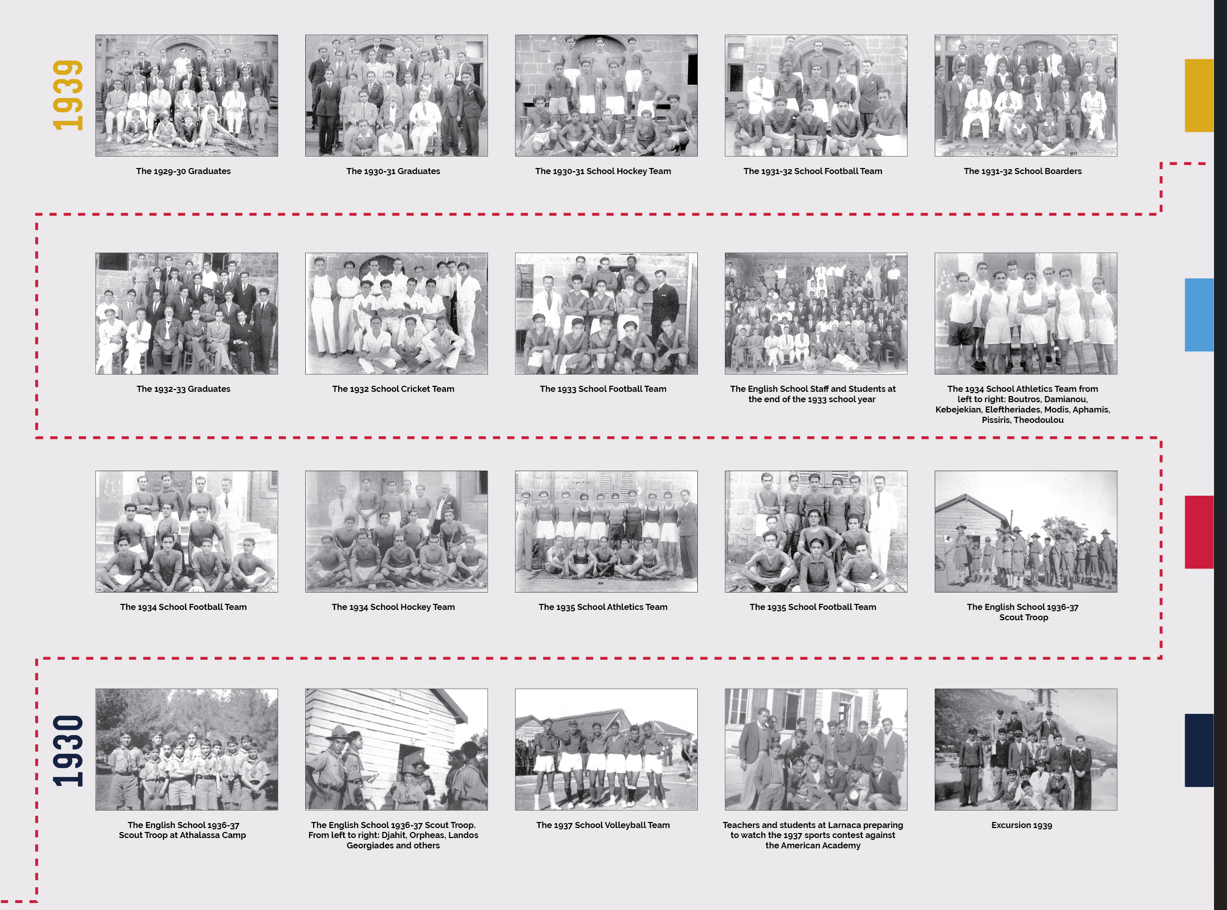
1940-1950 - Wartime Challenges
- 1940: Construction of the Lloyds Building as a boarding facility. During the summer holidays, the students voluntarily build air-raid shelters under the athletics stadium and offer their service to the government as first-aid assistants and stretcher-bearers.
- 1941-1943: Temporarily relocated to the Castelli Hotel in Kyrenia due to World War II, with the Nicosia campus serving as an army hospital. The Seaview Hotel, the east wing of the Dome Hotel, and four rented houses serve as accommodations for staff and students. Shops are also rented for use as classrooms. As a result of the move, the number of boarders increase from 22 to 173.
- 1942: The school is inoculated after a fatal measles, mumps, and typhoid epidemic.
- 1943: Professor Alkidas retired after serving The English School with distinction for over two decades. Even after retirement, he continued to teach voluntarily, demonstrating his unwavering commitment to students.
- 1946: Canon Frank Darvall Newham, founder, died in Kyrenia, leaving behind a legacy of innovation and inclusivity.
- 1947: Mr Eustace Jackson is appointed Headmaster.
- 1948: The Alks Boarding House was officially completed and named in his honour, celebrating his lifelong service to the School. The house provided accommodations for students from distant villages and embodied the School's values of diversity and unity.
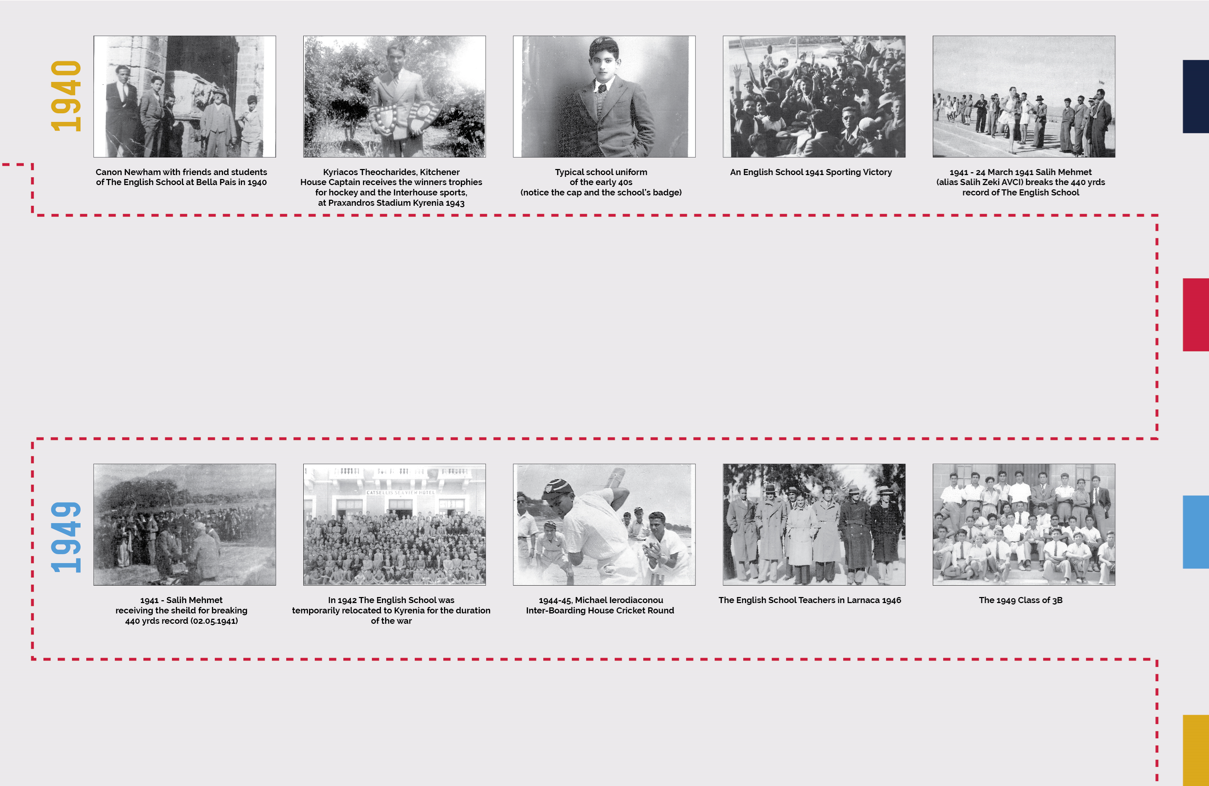
- 1951: First Troodos Excursion: Students embarked on a trip to the Troodos Mountains, an early example of the school’s focus on extracurricular activities that connect students with the island’s natural environment.
- 1952: Establishment of Cyprus's First Science Laboratories - The school opened the island's first science laboratories recognized for university examinations, enhancing science education in Cyprus.
- 1955: School Hockey Champions: The English School Hockey Team triumphed in the inter-school championships, showcasing the school’s excellence in sports.
- 1956: Mr Paul Griffin appointed Headmaster
- 1957: Established an affiliated English School for Girls, expanding educational opportunities. Introduction of Music Classes: The violin class was established, emphasizing the school’s growing dedication to fostering musical talents.
- 1958: The School numbers drop from 550 to 300 due to the political situation as the school is seen as 'Un-Christian', An epidemic of the Asian Flue sweeps the school with half of its population being struck down in one day. The Alks building becomes one vast hospital. Physical Education Innovations: Mr. Ronnie Brown introduced new physical education techniques, marking a turning point in the school's approach to sports and fitness. Sporting Excellence: Gursel Enver, representing Newham House, won the high jump competition, a testament to the school’s athletic achievements.
- 1959: Introduction of Co-Education: By this year, co-educational activities were becoming more integrated, fostering inclusivity and collaboration among students.
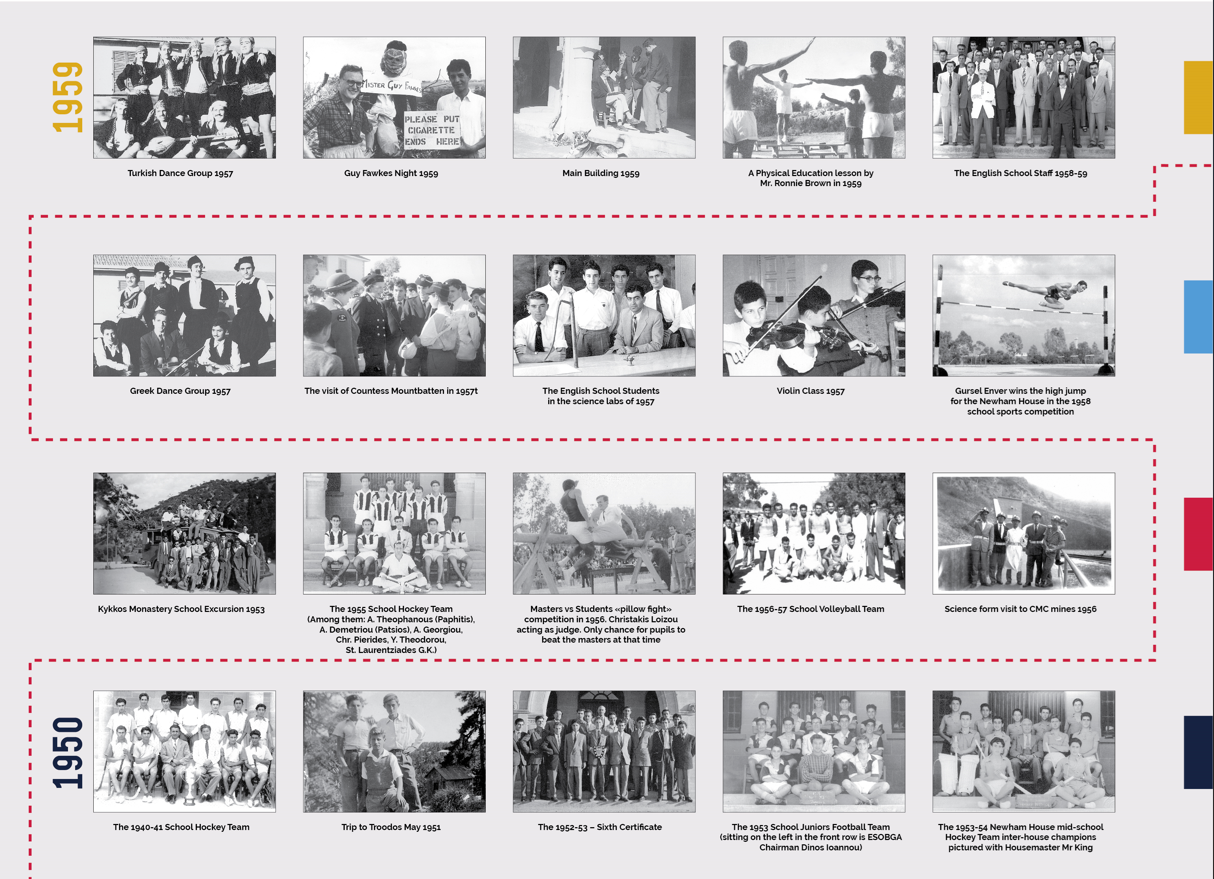
- 1960: Following Cyprus' independence, control of the school passed to the Cypriot Government. Mr Rex Hamer is appointed as Headmaster. The English School Staff Association (ESSA) was established. It serves as a platform for faculty and staff to collaborate on enhancing the school's educational environment and addressing professional matters.
- 1962: Merged with The English School for Girls, becoming a co-educational institution. Mr Anthony Eggleston was appointed as Headmaster.
- 1963: In December, the inter-communal troubles started between Greek Cypriots, which resulted in Turkish Cypriot staff and students leaving the School. The National Guard takes over the Lloyds Boarding House.
- 1965: The English School Parents and Guardians Association (ESPGA) was established. It is dedicated to fostering a strong partnership between parents, guardians, and The English School, Nicosia, supporting the school's academic, social, and cultural objectives.
- 1968: The English School in Nicosia has a distinguished history with The Duke of Edinburgh's International Award, being the oldest Independent Award Centre in the world. Headmaster Mr. David H. Humphreys initiated the Award, marking the beginning of a long-standing tradition that has equipped hundreds of students for life over the past 50 years. Mr. David Humphreys was appointed as Headmaster. He was the longest-serving Headmaster. The English School Old Boys Association (ESOBA) changes its name to The English School Old Boys and Girls Association (ESOBGA), welcoming female members to its association. The English Institute, opens its doors operating under the guidance of The English School in Nicosia. Its primary objective has been to enrich students' educational backgrounds with language skills that serve as valuable assets.
- 1969: Established the 5B4ES amateur radio club, operated by students.
- 1970: Under the direction of Music Master Panos Panayi, the school established Cyprus's first complete symphony orchestra. The inaugural concert took place on June 24, 1970, showcasing the school's commitment to musical excellence
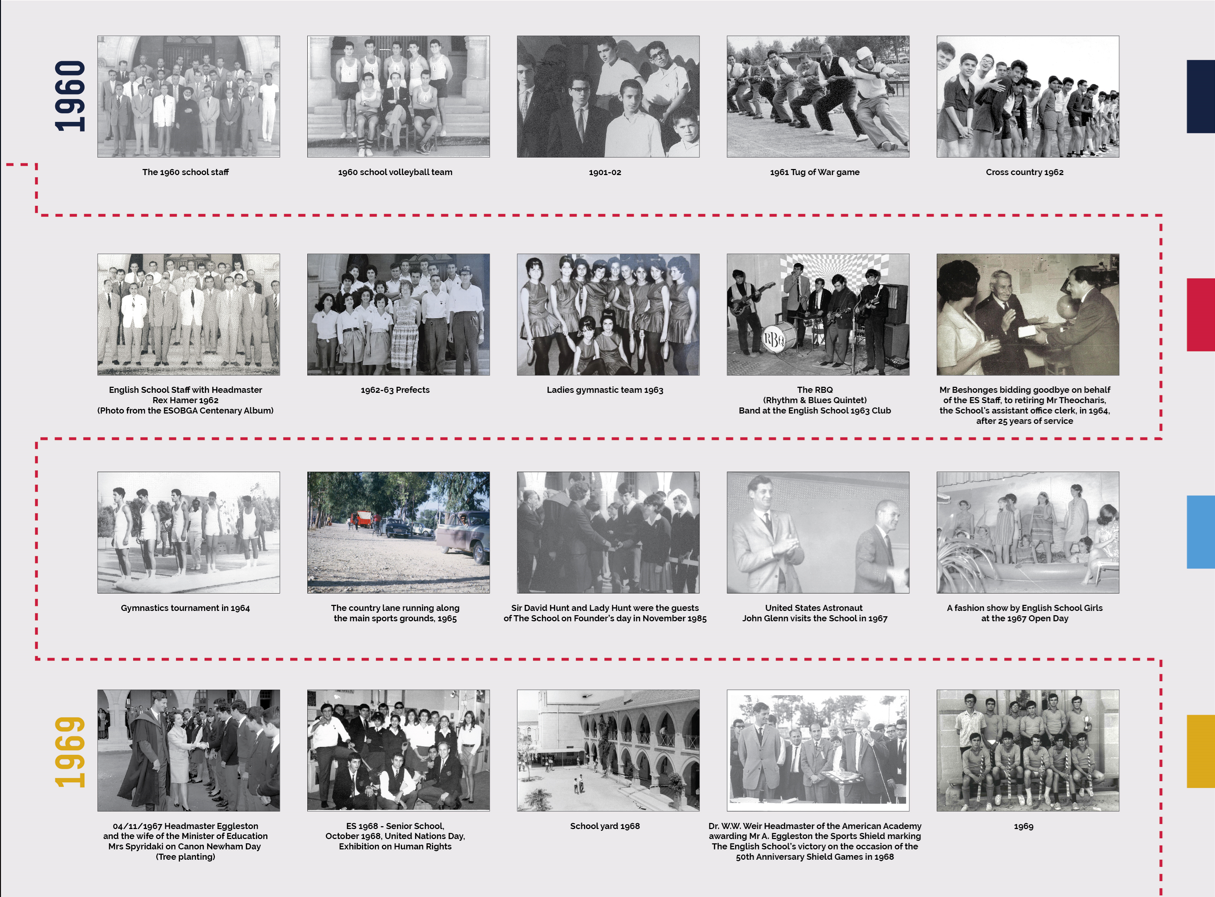
1970-1980 Turbulent Times
Continued growth in student enrollment, exceeding 1,000 by the early 1970s.
- 1971: Mr. Vrahimis Petri was appointed as a Maths teacher. Mr. Petri's legacy at The English School spans decades of dedicated service, from his early years as a student to his many years as an esteemed teacher, mentor, and leader.
- 1974: Mr Humphreys, the Headmaster, makes every effort to keep the school open and avoid staff redundancies. The school opens on the 30th of September with a population of 610, which is far less than in previous years, reaching 916. In the prevailing situation, the Headmaster makes every attempt to cut costs so that the School's continuation is ensured. Staff contributed by making a 20% salary cut.
- 1975: Despite challenges, the School maintained its mission to serve all communities and provide quality education. D.H. Humphreys mentions the school's high academic standards. Over five summers, the school made 6669 subject entries at O-and A-Level, of which 5239 (78.5%) were passed, and of these passes, 1110 (21%) were at Grade A.
- 1979: Mr Luther Salakian M.B.E., a dedicated teacher and mentor at The English School for 50 years, exemplified the virtues of humility, devotion, and humanity, passed, leaving an enduring legacy commemorated through the annual Salakian Hockey Trophy and his lifelong service to education and community.
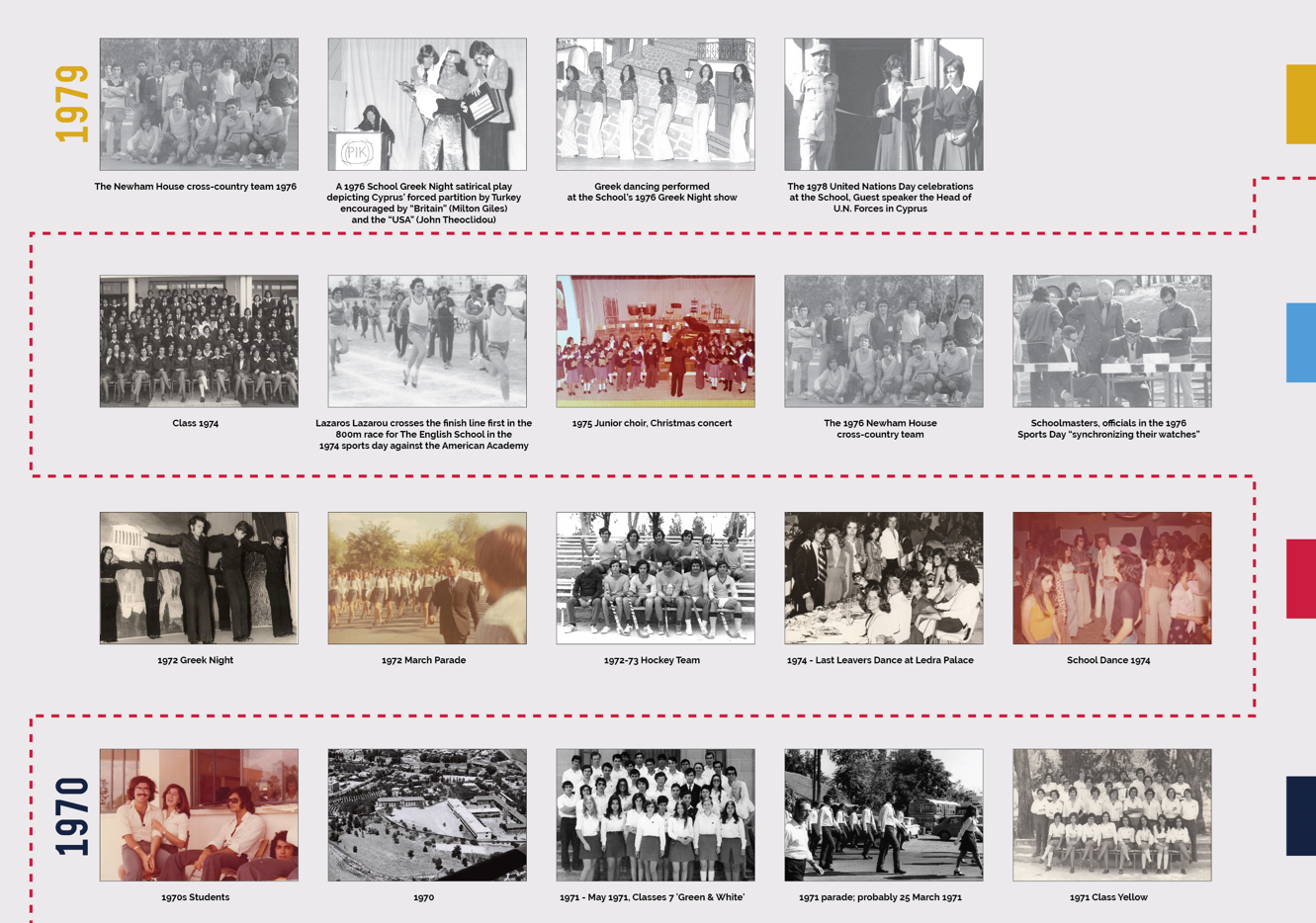
1980-1990 - Expansion and Modernization
The Lloyds Boarding House was repurposed as classrooms for younger students.
Focus on modernizing facilities and maintaining high academic standards.
- 1982: English School Orchestra Performance - The school orchestra, conducted by Mr. A. Panayi, performed at the Municipal Theatre, marking a highlight in the school's dedication to musical excellence.
- 1983: Support for Sports from the Community - Mr. K. Theocharides donated hockey equipment on behalf of Mobil, reflecting the strong community support for the school's extracurricular activities.
- 1984–1985: Basketball and Volleyball Achievements - The junior girls' basketball team and volleyball team achieved all-island championships under the guidance of Coach Mr. T. Christofides, further solidifying the school's athletic legacy.
- 1985: Celebrated 85 years of educational excellence, reaffirming its commitment to academic rigour.
- 1988: Mr Albert Hudspeth appointed Headmaster. Introduced new extracurricular programs, enhancing student development.
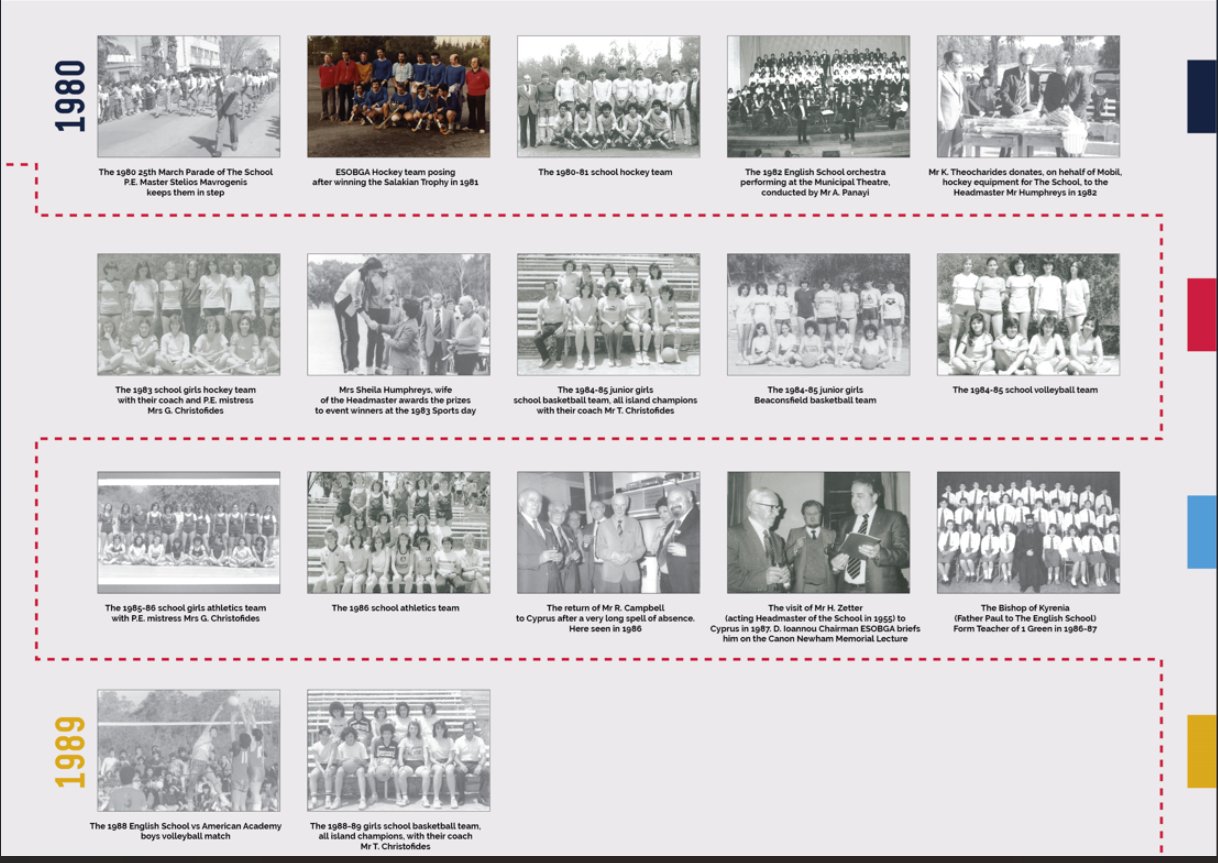
1990-2000 - A New Era
- 1990: Addition of the Sports Centre, enhancing athletic opportunities for students. The School reinforced its leadership in extracurricular excellence, from debating to music.
- 1992: A fire breaks out, causing extensive damage to a large part of the Main Building. Once again, the ES community comes together, and repairs are quickly made. No school days are lost.
- 1993: Prince Philip, Duke of Edinburgh, visited the school and presented the Duke of Edinburgh's Award to students, highlighting the institution's active participation in the program.
- 1995: Hosted the World Individual Debating and Public Speaking Championships, showcasing its commitment to global discourse. The school introduced "Talent Night," an annual event designed to provide students with a platform to express their talents in music, drama, poetry, dance, and other forms of self-expression. This initiative broadened the scope of the school's musical and artistic activities beyond traditional concerts
- 1996: Mr Thomas Thomas was appointed as Headmaster.
- 1998: Mr Emilios Solomou was appointed as Acting Head.
- 1999: Mr Robert Swan was appointed as Headmaster.
- 2000: Celebrated its centenary, marking 100 years of educational service. Hosting the World Individual Debating and Public Speaking Championships (WIDPSC) Again - The school hosted the WIDPSC for the second time, reinforcing its commitment to promoting debating and public speaking excellence.
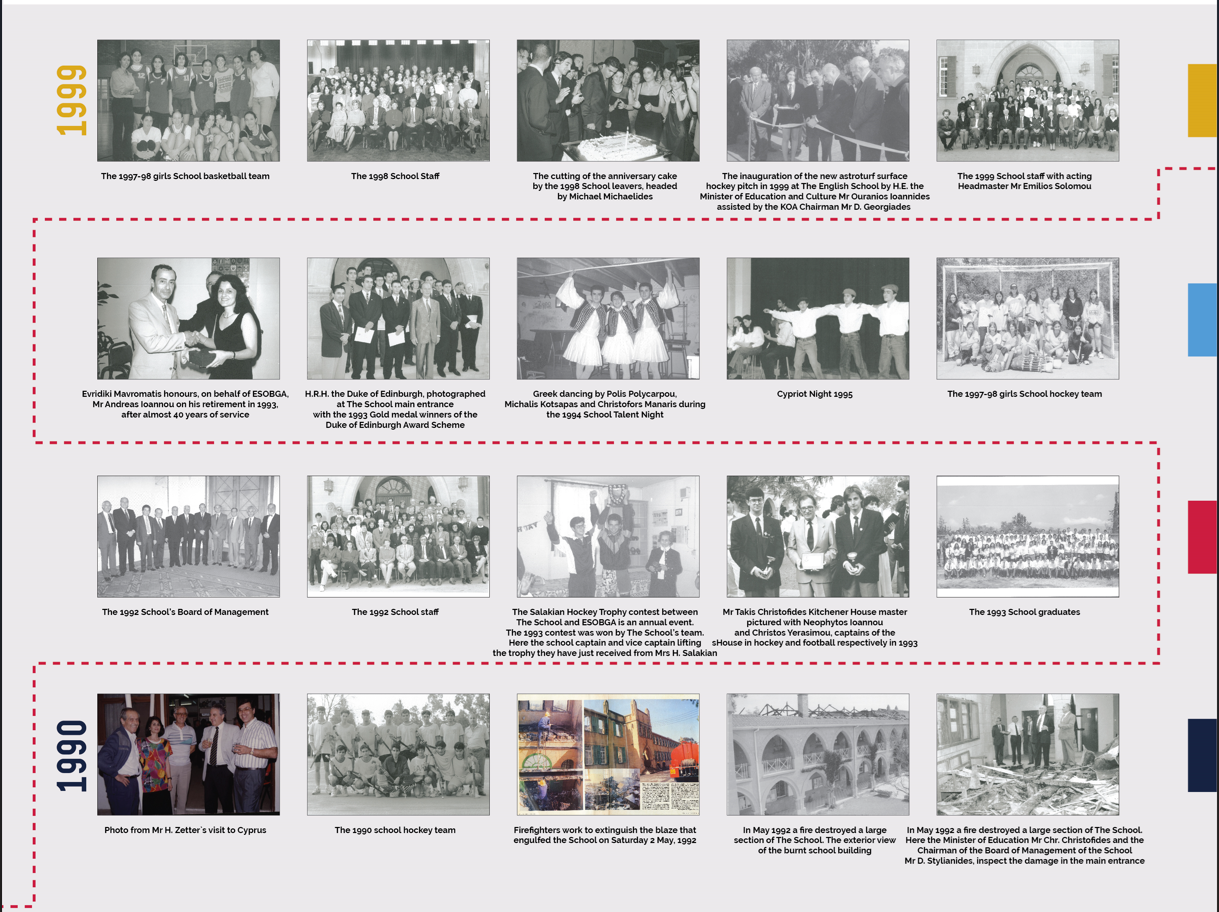
2000-2010 - Commitment to Diversity
- 2003: Mr Stuart J Haggett appointed as Headmaster. Re-enrolled Turkish Cypriot students, reinstating its bi-communal status. Turkish Cypriot students were welcomed back, emphasizing inclusivity and inter-communal harmony.
- 2004: Unveiled a new science building, modernizing its facilities. Invested in state-of-the-art facilities.
- 2005: Third Hosting of the World Individual Debating and Public Speaking Championships (WIDPSC) - The English School hosted the WIDPSC for the third time, further establishing its reputation in the global debating community.
- 2006: Inauguration of the Mediterranean Model United Nations (MEDIMUN)—The English School initiated MEDIMUN, which provides students with a platform to engage in diplomatic simulations and enhance their understanding of international relations.
- 2009: The first woman Headteacher is appointed Ms Deborah Duncan.
2010-2020 - Building for the Future
Continued success in academic and extracurricular activities, with recognition in national and international competitions.
- 2011: Mr Graham Gamble is appointed Headmaster.
- 2015: Mr Graham Garrett is appointed Headmaster. The Independent School Inspectorate inspects the School. There are 1128 total students (596 boys, 532 girls).
- 2016: The English School actively participates in the Junior Achievement (JA) program, offering students opportunities to develop entrepreneurial skills. This year 11 teams entered the competion.
- 2017: The construction of the Newham Building has begun, expanding academic spaces. May/June results see A*-B for GCE A Level at 88.5% and I/GCSE results at 91.8%.
- 2017: First Direct Radio Contact with the International Space Station (ISS) - Students from the school's Radio and Astronomy Clubs successfully listened to a direct radio transmission from the ISS as it passed over Cyprus
- 2018: Dr Chris Mavrommattis was appointed as acting headmaster. The multi-use Sports Centre has been completely renovated, with new changing rooms. The May/June results show A*-B GCE A Level at 85.6% and I/GCE results at 87.8%.
- 2018: Mr David Lambon is appointed Headmaster. First Live Discussion Between Cypriot Students and a NASA Astronaut in Space - Through the ARISS (Amateur Radio on the International Space Station) program, students engaged in a live conversation with NASA astronaut Mark Vande Hei aboard the ISS. This event marked a first in Cyprus's educational history.
- 2019: Opening a state-of-the-art weights room/gym at the Sports Centre. I/GCSE The English School percentage of Grades 9/8/7 (formerly A*) was 74%. (Compared with the UK average, which was only 20.7%). GCE Grade A*/A was 70.9% compared to the UK average of 25.2%. Recognized as a British School Overseas by the UK Department for Education, affirming its adherence to British educational standards.
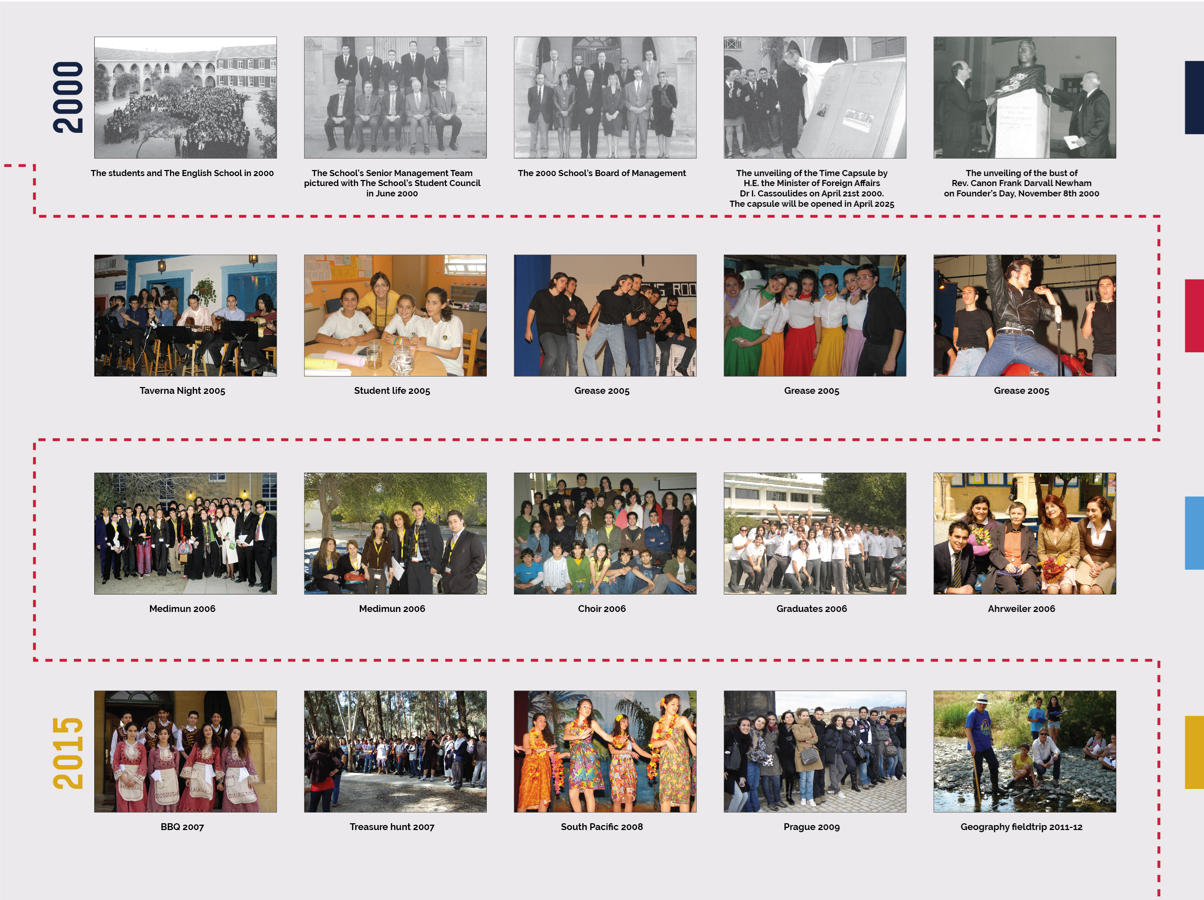
2020–Present: A Legacy of Excellence 2024:
The School remains a leader in education, fostering inclusivity, academic achievement, and a commitment to serving all Cypriot communities.
- 2020: The introduction of a Tennis Centre with five new tennis courts. With the coronavirus outbreak, schools are locked down, and The English Schools takes on a new digital existence.
- 2021: Renovation of the Main Football Pitch, installation of a new artificial grass surface, and the addition of two new outdoor basketball courts.
- 2022: Refurbishment of the Athletics Track. In June 2022, The English School in Nicosia honoured its distinguished alumnus, Professor Kypros Nicolaides, by naming its Science Building after him. This tribute recognizes Professor Nicolaides' pioneering contributions to fetal medicine and his enduring connection to the school.
- 2022: Prince Edward, Earl of Wessex, visited the school as part of Queen Elizabeth II's Platinum Jubilee celebrations. During his visit, he met with students and staff, acknowledging the school's rich heritage and its contributions to education.
- 2023: Stuart Walker became the current Headmaster, continuing the tradition of visionary leadership.
- 2024: Celebrated outstanding academic achievements, with students earning prestigious awards across 19 categories in the Pearson Learner Awards for the May/June 2024 session. It continues to uphold its tradition of excellence, preparing students for meaningful and fulfilling lives in a global society.
Throughout its 125-year history, The English School, Nicosia, has remained a beacon of educational excellence. It has adapted to changing times while steadfastly upholding its founding principles.
